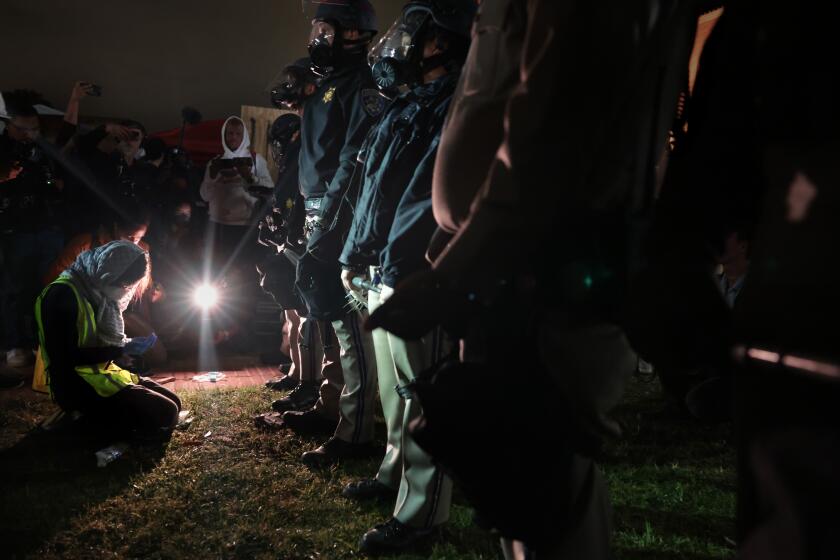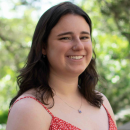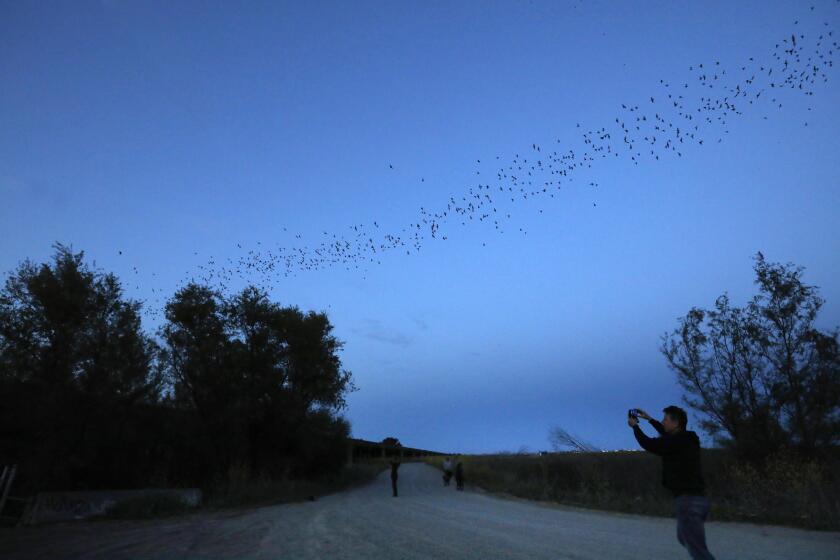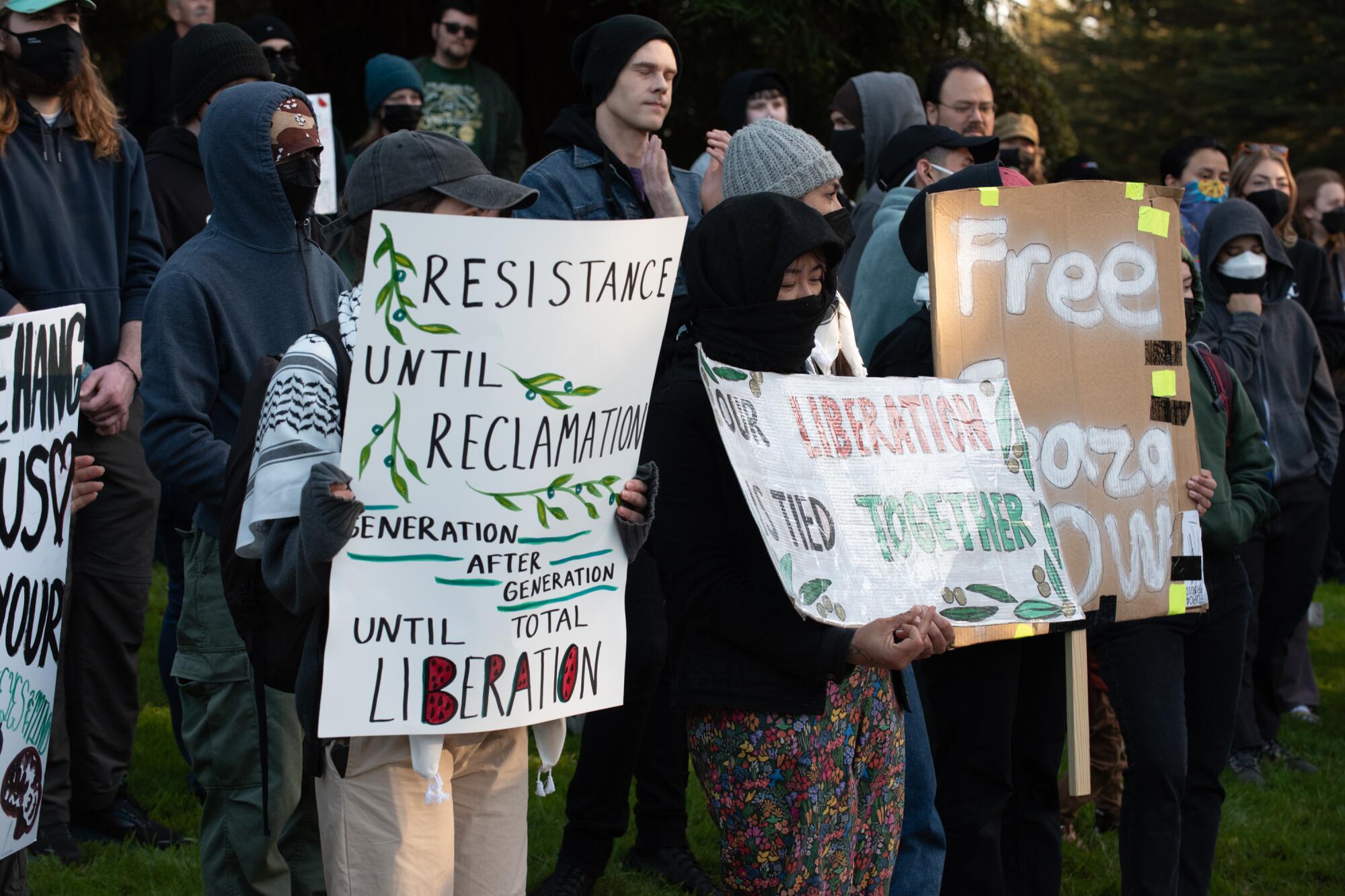
ARCATA, Calif. — Ending a weeklong siege, police on Tuesday arrested at least 25 protesters at Cal Poly Humboldt, where Gaza war demonstrators had occupied buildings and forced the campus to close.
The move came as pro-Palestinian protesters, who are demanding divestment from Israel and an end to the country’s military actions in Gaza, set up several new tent encampments at colleges and universities across California as tensions escalated.
Police were in a standoff with protesters on the Humboldt campus Monday night, telling more than 100 they had to leave. Demonstrators, some wearing goggles and helmets and carrying makeshift shields, spent the night chanting and playing music. At 9 p.m., a police vehicle drove by and announced they could be subject to rubber bullets and chemical agents. Some faculty members, who were told by the university they should not enter campus, massed just outside, observing.
Shortly after 2 a.m. Tuesday, police moved in and made the arrests. The university said “those arrested faced a range of different charges depending on individual circumstances, including unlawful assembly, vandalism, conspiracy, assault of police officers and others. In addition, students could face discipline for conduct violations while any university employees arrested could face disciplinary action.”
As part of the operation, officers said they cleared Siemens Hall and Nelson Hall East. No injuries were reported.
“This is a difficult day. It breaks my heart to see it, and truly nobody wanted to see things come to this. We’ve all watched this with great concern, and always with the sincere hope that it would be resolved peacefully,” Cal Poly Humboldt President Tom Jackson Jr. said in a statement. “Unfortunately, serious criminal activity that crossed the line well beyond the level of a protest had put the campus at ongoing risk.”
Many protesters and faculty thought the closure of campus was unnecessary and that the university had escalated the situation for unwarranted reasons. The occupation of one building did not seem to merit a complete lockdown, they said.
Many demonstrators also bristled at allegations that they were violent, firing back that they were peaceful while it was police who had been violent.
It is unclear when the campus will reopen.
One of the activists arrested, assistant professor Rouhollah Aghasaleh, vowed to reject any bond and embark on a hunger strike until he and all his students were released.
“I refuse to accept the label of criminal for standing up for an ethical reason,” he wrote in a statement before his arrest. “Our arrest on a stolen land and in a place that we consider home is an act of violence.”
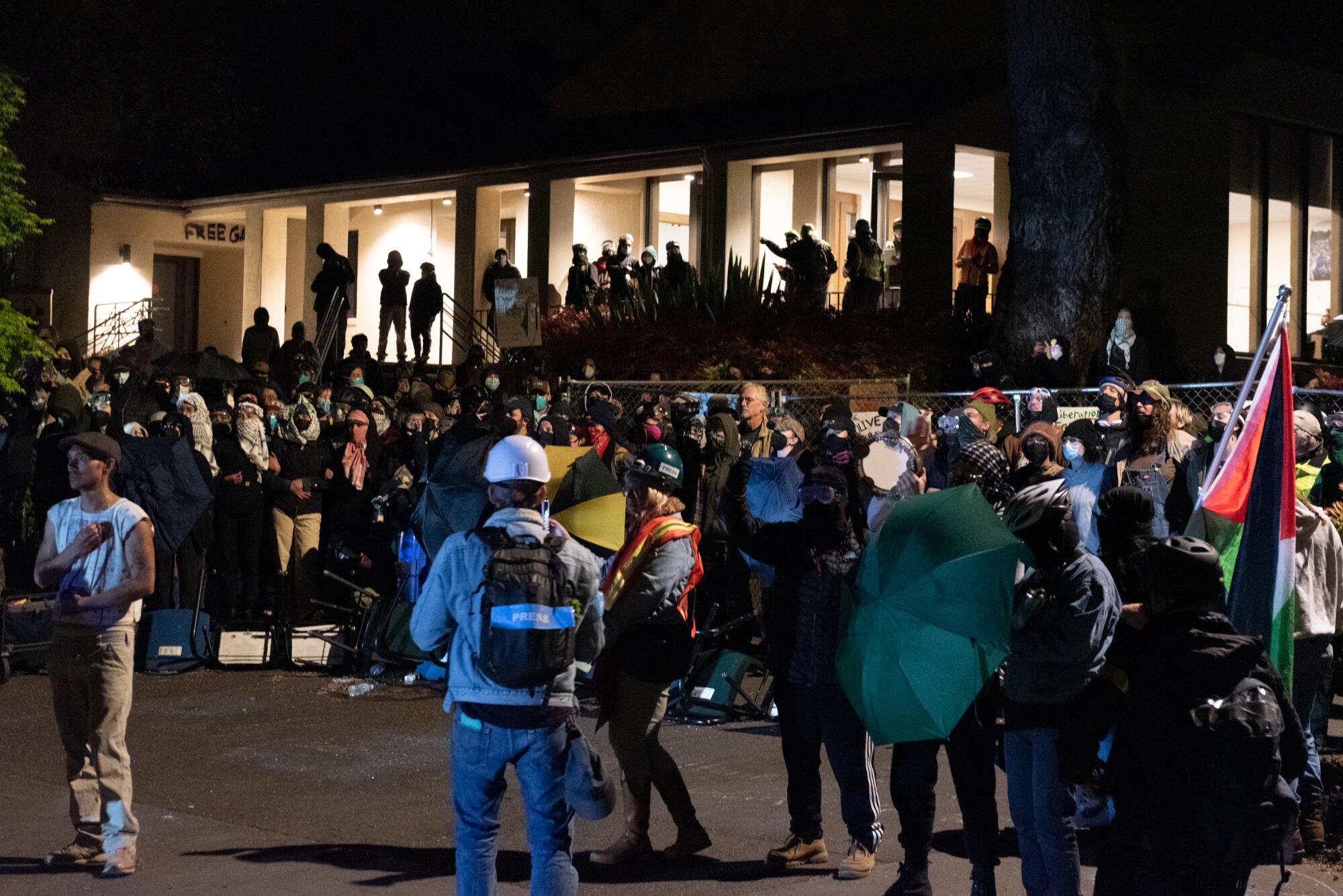
Protests have intensified at universities across the nation. At Columbia University, dozens of protesters took over a building, barricading the entrances and unfurling a Palestinian flag out of a window.
In a statement Monday, Sacramento State President J. Luke Wood said the campus “remains open and fully operational” while demonstrators camp in the Library Quad.
As pro-Palestinian protests grow at California colleges and universities, counterprotesters spark clashes at UCLA.
“As a public university, we are committed to creating and fostering safer conditions to support student engagement in constitutionally protected activities,” he wrote. University officials, he said, are “currently focused on ensuring that campus remains safe, and that instruction and other critical operations can continue.”
UC Riverside
A UC Riverside spokesperson said in a statement that “all operations on campus are proceeding as usual.”
Students have demanded that universities explicitly acknowledge the suffering in Gaza.
On Monday, UC Riverside Chancellor Kim Wilcox, in a letter to the campus community, said that “the suffering in Gaza since the start of this war has been unimaginable — more than 30,000 deaths, millions of people displaced, and hunger that is bordering on famine.”
“The crisis has affected many on our campus in a personal and profound way,” Wilcox wrote.
While the university supports free speech, Wilcox wrote, “speech and activity that disrupts campus operations is not protected.” Large signs and banners will be removed, and the blocking of access to campus venues will not be tolerated, the statement read.
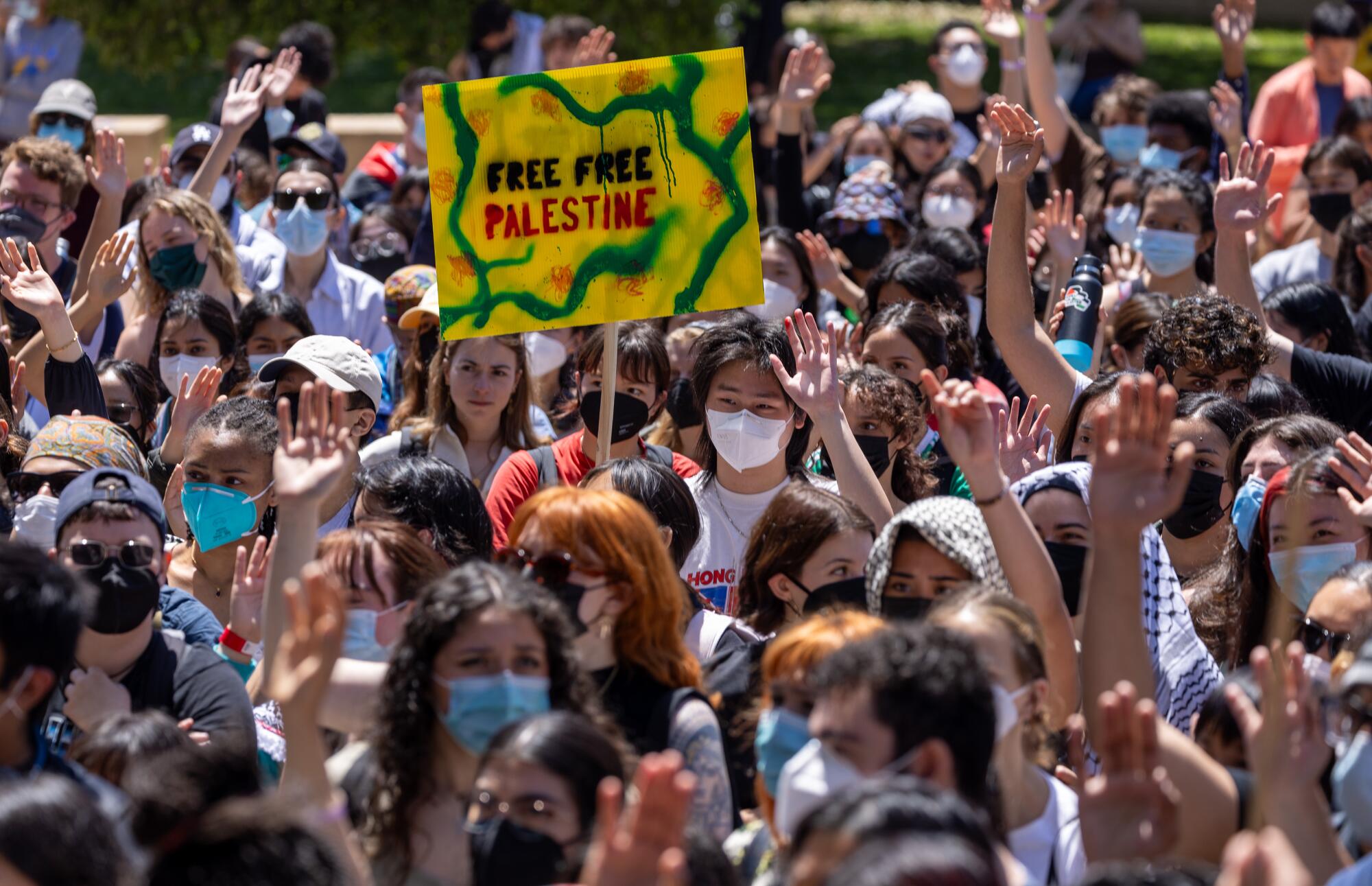
UC Irvine
At UC Irvine, campus police and local law enforcement stood by, monitoring an encampment that was erected Monday morning.
About a dozen tents stood on the pavement between John V. Croul Hall and Rowland Hall. Green barricades enclosed the encampment, and signs on the partitions read “Free Palestine” and “Bothered by encampment? Look away like you do 4 genocide.”
Em Wang, a fourth-year student, said the encampment was modeled on those being used by refugees in Gaza.
“We want all eyes on Gaza, and we don’t want our encampments to be a distraction from Gaza,” she said.
“We recognize that our educational institutions and our universities are complicit in the genocide of Palestine.”
Although officers with the campus and Irvine police departments and the Orange County Sheriff’s Department stood nearby Monday afternoon, they mostly did not intervene and were not dressed in riot gear.
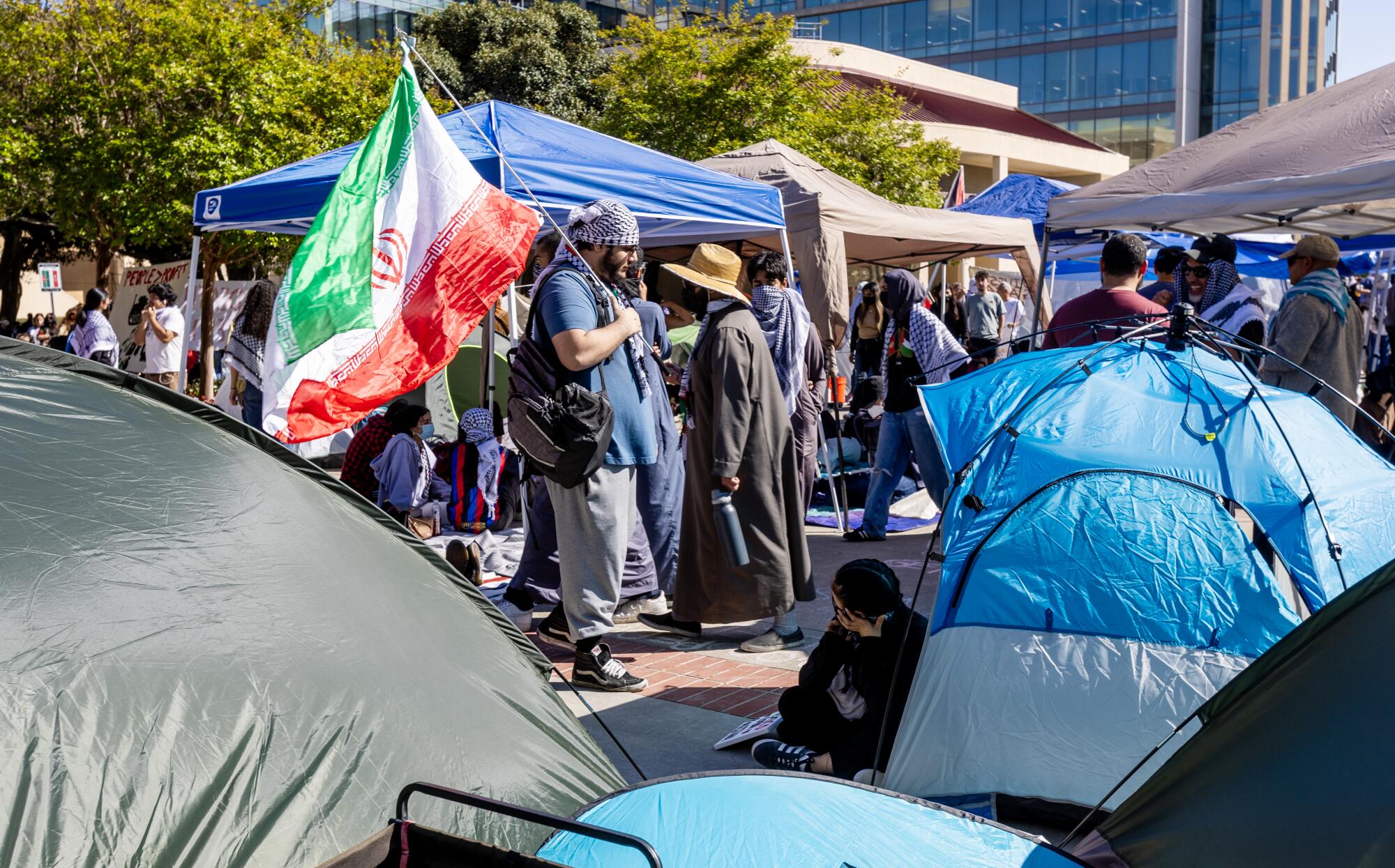
Sarah Khalil, 21, a fourth-year student, said protesters are prepared to stay in the encampment as long as it takes for the university to negotiate with them.
“It is a humanitarian cause, and it’s a genocide that’s killed over 30,000 people,” said Khalil, who noted that she is Palestinian and her family was forced to leave their country.
The group posted a banner listing their demands: End “violent extremism” funding, promise amnesty for student protesters, commit to an academic boycott of Israel and remove what the group calls “Zionist programming.”
UC Irvine Chancellor Howard Gillman said in a statement Monday night the encampment is set up in a space that “violates the law, violates our policies and disrupts our mission.”
“We have reached out to the students in the existing illegal encampment and have made it clear to them that if they believe they need an encampment space on campus to peacefully express their views, then we will work with them to find a space that is appropriate and non-disruptive,” Gillman said.
Occidental College
At Occidental College, which has fewer than 2,000 students enrolled, about 60 students set up an encampment around 4 a.m. Monday, working in the darkness to avoid potential issues with campus security, said co-organizer Matthew Vickers, a junior studying diplomacy and world affairs.
“We wanted to be as clandestine as possible to not be interrupted,” said Vickers, a member of the Occidental chapter of Students for Justice in Palestine.
Dozens of tents occupied the quad at the center of campus. Students lounged on the grass, chatted with friends and worked on laptops in tents. Vickers said that campus security officers stopped by Monday morning but were respectful and did not interfere.
In an email to faculty and staff Monday afternoon, Occidental President Harry J. Elam Jr. said the encampment had “so far engaged in peaceful demonstration” and the college would “remain steadfast in [its] commitment to ensure that any dialogue or demonstration remains safe and peaceful.”
Vickers said protesters will occupy the space until the college addresses their demands, which include divesting from Israel and calling Israel’s military campaign against Gaza a genocide.
Protesters at Pitzer College, another small school with about 1,200 undergraduates enrolled, have spent several days inhabiting a tent city called the “Palestine Solidarity Encampment.”
USC
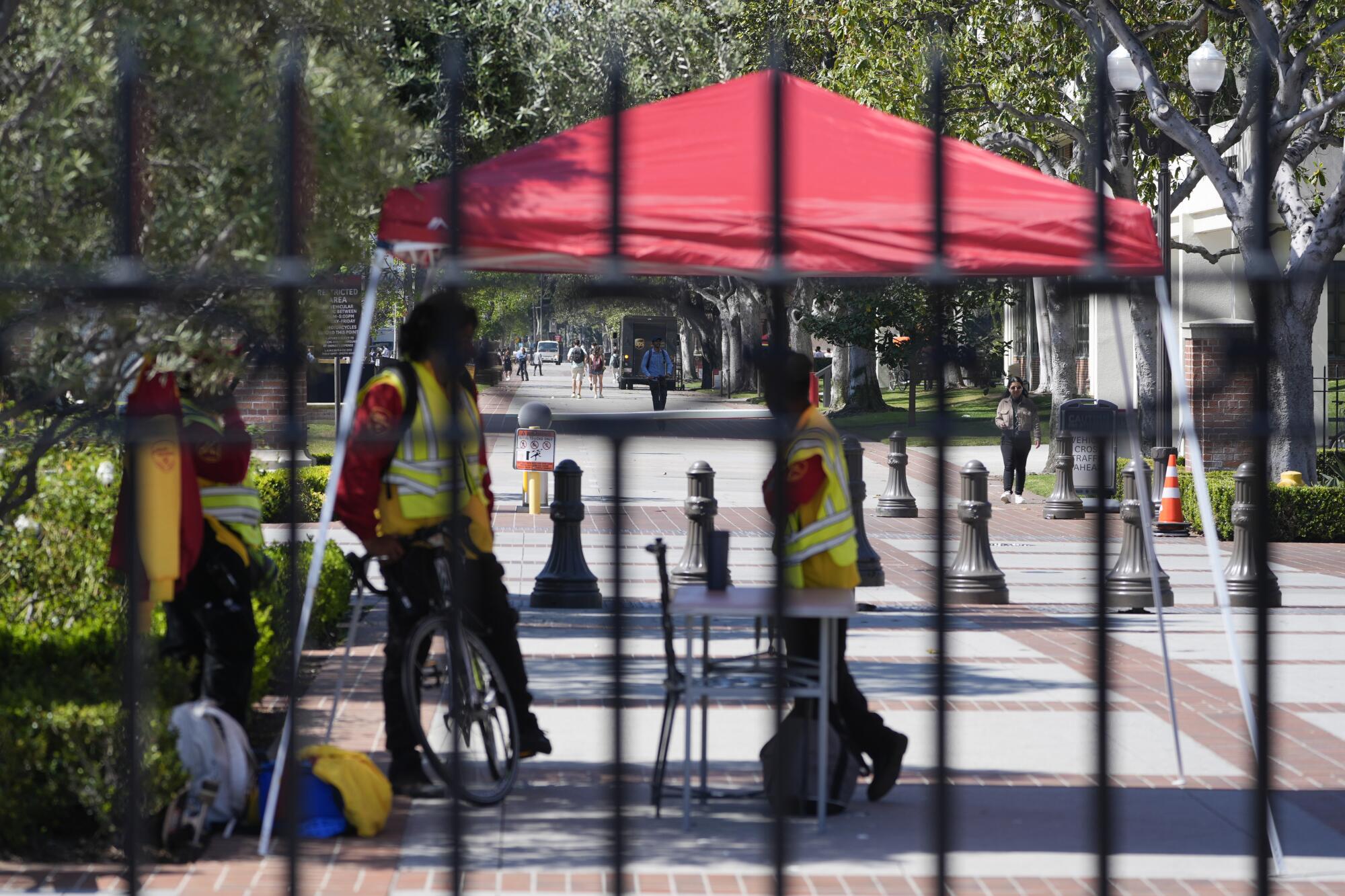
At USC, where Los Angeles police arrested 93 people on trespassing charges last week as they cleared an encampment at the center of campus, a reestablished camp site was mostly quiet on Monday.
Each day at the encampment starts with a daily briefing and includes teach-ins, poetry readings hosted by professors, yoga and crafts. Volunteers have provided enough food for campers to have three meals a day.
Participants declined to provide their names, citing safety concerns.
“I think the narrative is that we’re a security issue or we’re scaring other people, when in reality it is a place of care and love,” said one participant who is involved with the USC Divest from Death Coalition. “We are all here because at the end of the day, we believe in humanity.”
Columbia University and elsewhere
At Columbia, protesters locked arms in front of Hamilton Hall early Tuesday and carried furniture and metal barricades to the building, one of several that was occupied during a 1968 civil rights and anti-Vietnam War protest on the campus, video showed. Posts on Instagram shortly after midnight urged people to protect the encampment and join them at Hamilton Hall. A “Free Palestine” banner hung from a window, according to the Associated Press.
Dozens of people were arrested Monday during protests at universities in Texas, Utah, Virginia and New Jersey, while Columbia said hours before the takeover of Hamilton Hall that it had started suspending students. Columbia has canceled its main graduation event.
Times staff writers Garrison reported from Arcata, Fry from Irvine, Jarvie from Atlanta and Ahn, Peterson and Petrow-Cohen from Los Angeles. The Associated Press contributed to this report.
More to Read
Sign up for Essential California
The most important California stories and recommendations in your inbox every morning.
You may occasionally receive promotional content from the Los Angeles Times.
